新概念英语第101-102课课件
合集下载
新概念第一册Lesson101-102PPT课件
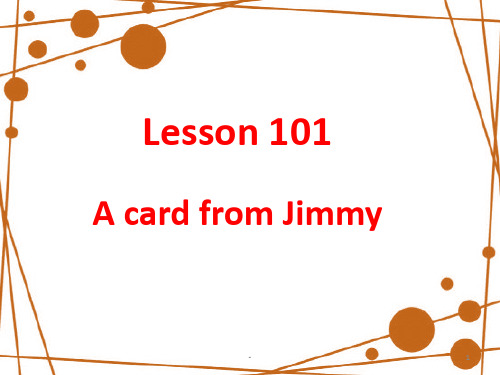
-
16
She kept her youth. 她青春依旧
-
17
• association n. 协会 • 我父亲是牙医协会的会长。
• My father was the president of the dental association.
• 在组织或者机构前要加定冠词the • the United Nations • the International Olympic Committee
-
34
• She said to me,“I have left my book in your room.” 直接引语
• She told me that she had left her book in my room. 间接引语
-
35
• Mr. Smith asked, “What is your name?”直接 引语
• As soon as he comes,I’ll tell you.
• Speak up.
• = Louder, please. • = Say it loudly, please.
-
30
• I'm afraid (that) I can't hear you.
• hear listen to
-
39
• 1. Tom does his homework every day, doesn’t he ?
• 2. He’s swimming now, isn’t he
-
19
• --write v. 写 • 请你把姓名,地址写在这里。 • Write your name and address here, please.
新概念英语第一册101102课精美课件课件

“Is he your brother?〞 he said.
He asked if he was my brother.
Mr. Smith asked, “What is your name?〞
Mr. Smith asked what my name was.
• 如果直接引语为祈使句,变为间接引语时 多用“名词〔代词〕+不定式〞构造。
• Winter has come too soon. • 冬天来得太早了
• The sooner, the better. • 越快越好 • as soon as 一…就… • 你一完成就告诉我
• Tell me as soon as you have finished.
• --write v. 写 • 请你把姓名,地址写在这里。 • Write your name and address here, please. • 你报告写好了没有? • Have you written the report yet? • 我用铅笔还是用钢笔写? • Shall I write in pencil or in ink? • 用英文写 • write in English • Write to sb. 给某人写信 • 我一个月给我家人写两封信。 • I write to my family twice a month.
直接引语和间接引语
• 直接引语就是直接引用说话人原来所说的 话,而间接引语就是原话的转述。
• 直接引语放在引号里,间接引语是把说话 人的原话变成宾语从句。
• 直接引语变间接引语须在人称,时态及地 点状语等方面作相应的变化。
1.如果直接引语为陈述句,变为间接引语时 常用附属连词that引导〔口语中可省略〕, 引述动常常用say, tell等。同时,概据主语 的要求,间接引语须在人称,时态及其它 方面作相应的变化。
He asked if he was my brother.
Mr. Smith asked, “What is your name?〞
Mr. Smith asked what my name was.
• 如果直接引语为祈使句,变为间接引语时 多用“名词〔代词〕+不定式〞构造。
• Winter has come too soon. • 冬天来得太早了
• The sooner, the better. • 越快越好 • as soon as 一…就… • 你一完成就告诉我
• Tell me as soon as you have finished.
• --write v. 写 • 请你把姓名,地址写在这里。 • Write your name and address here, please. • 你报告写好了没有? • Have you written the report yet? • 我用铅笔还是用钢笔写? • Shall I write in pencil or in ink? • 用英文写 • write in English • Write to sb. 给某人写信 • 我一个月给我家人写两封信。 • I write to my family twice a month.
直接引语和间接引语
• 直接引语就是直接引用说话人原来所说的 话,而间接引语就是原话的转述。
• 直接引语放在引号里,间接引语是把说话 人的原话变成宾语从句。
• 直接引语变间接引语须在人称,时态及地 点状语等方面作相应的变化。
1.如果直接引语为陈述句,变为间接引语时 常用附属连词that引导〔口语中可省略〕, 引述动常常用say, tell等。同时,概据主语 的要求,间接引语须在人称,时态及其它 方面作相应的变化。
新概念第一册101-102课课件
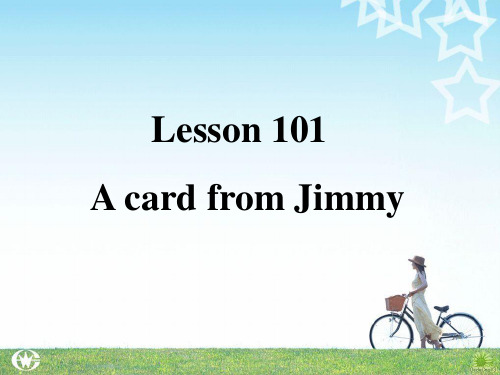
当陈述部分的主语是i而句子又用来征询对方的意见时附加疑问句中的主语用而句子又用来征询对方的意见时附加疑问句中的主语用you
Lesson 101 A card from Jimmy
New words:
• Scotland /'skɔtlənd/ n.苏格兰(英 国) • card /kɑ:d/ n. 明信片
反意疑问句
1. 当陈述部分的主语是I,而句子又用来征询对方的 意见时,附加疑问句中的主语用you。如: I find English very interesting, don’t you? I don’t like that film, do you? 2. 当陈述部分的主语是everybody, everyone, someone, nobody, no one, somebody等合成 代词时,附加疑问句中的主语通常用they。但亦 可用he,尤其是nobody, no one等作主语,具有 否定概念时。如: Somebody phoned while I was out, didn’t they? Nobody wants to go there, does he?
Let’s have a basketball match this afternoon, shall we? Let us go out for a rest, will you?
Write the card:
Dear Mum, I have just arrive in Scotland and I'm staying at a Youth Hostel. I'll write a letter soon. I hope you all well.
• 10、‘Love, Jimmy.’ 信的末尾表示问候的常用语。 • =Yours, Jimmy.’ • 11、Is that all? • That’s all for today.
Lesson 101 A card from Jimmy
New words:
• Scotland /'skɔtlənd/ n.苏格兰(英 国) • card /kɑ:d/ n. 明信片
反意疑问句
1. 当陈述部分的主语是I,而句子又用来征询对方的 意见时,附加疑问句中的主语用you。如: I find English very interesting, don’t you? I don’t like that film, do you? 2. 当陈述部分的主语是everybody, everyone, someone, nobody, no one, somebody等合成 代词时,附加疑问句中的主语通常用they。但亦 可用he,尤其是nobody, no one等作主语,具有 否定概念时。如: Somebody phoned while I was out, didn’t they? Nobody wants to go there, does he?
Let’s have a basketball match this afternoon, shall we? Let us go out for a rest, will you?
Write the card:
Dear Mum, I have just arrive in Scotland and I'm staying at a Youth Hostel. I'll write a letter soon. I hope you all well.
• 10、‘Love, Jimmy.’ 信的末尾表示问候的常用语。 • =Yours, Jimmy.’ • 11、Is that all? • That’s all for today.
新概念英语101-102课课件

课文讲解
1.Read Jimmy’s card to me please, Penny. read sth to sb 把…读给…听(read sb sth) • Read the newspaper to me. 读这份报纸给我听。 • Can you read the letter to me? 你能给我读一下这封信吗?
直接引语和间接引语
• 直接引语就是直接引用说话人原来所说的 话,而间接引语就是原话的转述。
• 直接引语放在引号里,间接引语是把说话 人的原话变成宾语从句。 • 直接引语变间接引语须在人称,时态及地 点状语等方面作相应的变化。
1.如果直接引语为陈述句,变为间接引语时 常用从属连词that引导(口语中可省略), 引述动常常用say, tell等。同时,概据主语 的要求,间接引语须在人称,时态及其它 方面作相应的变化。 • She said to me,“I have left my book in your room.” • She told me that she had left her book in my room.
card n. 明信片,卡片 postcard 明信片
credit card 信用卡
an ID card
身份证
a birthday card
生日卡片
a new year card
新年贺卡
名片
扑克
Play cards 打扑克
youth n.
1)n. 青年人,年轻人(单复数同形) • The youth of the nation is polite in general. 该国的青年人 一 般都有礼貌。 2)青年(少年)时期,青春时期 • He spent his youth in the U.S.A 他少年时代在美国度过 3)青春
新概念英语NCE1_Lesson101-102(共30页)-2课件

• arrive in + 城市/ 国名(大地点) • 她昨天到了马德里。
• She arrived in Madrid yesterday. • arrive at +公共场所地点名称(airport,
park, the station)(小地点) • 我们十分钟前到达机场。
• We arrived at the airport the minutes ago.
• card
n. 明信片,卡片
• post card 明信片
credit card 信用卡
an ID card 身份证
a birthday card
生日卡片
a new year card
新年贺卡
名片
• Play cards • 打扑克
扑克
• --youth • 1)n. 青年人,年轻人(单复数同形) • 该国的青年人 一 般都有礼貌 • The youth of the nation is polite in general. • 2)青年(少年)时期,青春时期 • 他少年时代在美国度过 • He spent his youth in the U.S.A • 他年轻时学过意大利语。
• She said to me,“I have left my book in your room.”
• She told me that she had left her book in my room.
2. 如果直接引语为疑问句,变为间接引语时 关联词用whether, if 或其他疑问词;词序与 一般从句相同,引述动词常用say, ask, wonder等。
• He studied Italian in his youth. • 3)青春
新概念英语第一册101-102课课件-(共43张PPT)可修改全文

card n. 明信片,卡片 post card 明信片
credit card 信用卡
an ID(identihday card 生日卡片
a new year card 新年贺卡
2. 如果直接引语为疑问句,变为间接引语时关联词用whether,if(否则)或其他疑问词;词序与一般从句相同,引述动词常用say,ask, wonder(想知道)等。 “Is he your brother?” he said. He asked if he was my brother. Mr. Smith asked, “What is your name?” Mr. Smith asked what my name was.
Translation:
1.我刚到苏格兰,我现在在一家青年旅馆。 2.他说他刚刚苏格兰。 3.我可听不见你念的。 4.他没写多少,是吗? 5.他说他很快就会写信的。
Exercises:
1. Is Frank a member______ the Y.H.A. A. of B. in C. with D. at 2.They were in Japan last month,______? A. did they B. weren't they C. didn't they D. were they 3. Leo has just arrived _____ London. A. at B. to C. in D. for 4. She didn't go to school yesterday,_____? A. did she B. didn't she C. does she D. doesn't she 5. Please write ______ me if you have time. A. for B. to C. at D. with
新概念英语101-102课课件
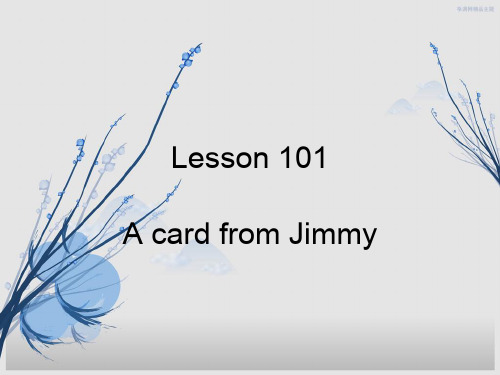
扑克
• --youth • 1)n. 青年人,年轻人(单复数同形) • 该国的青年人 一 般都有礼貌 • The youth of the nation is polite in general. • 2)青年(少年)时期,青春时期 • 他少年时代在美国度过 • He spent his youth in the U.S.A • 他年轻时学过意大利语。 • He studied Italian in his youth. • 3)青春
Lesson 101 A card from Jimmy
本课内容
• 单词学习 • 直接引语和间接引语 • 课文讲解 • 翻译句子 • 翻译对话 • 作业
Scotland card youth
hostel association soon write(wrote, written)
n. 苏格兰(英国) n. 明信片 n. 青年
• When else can we meet again? • 你还去过其它什么地方?
• Where else have you been? • 还有谁能做这件事?
• Who else can do it?
• He doesn’t say very much, does he?
• 反意疑问句
• 由两部分组成,前面是一个陈述句,后面 是一个简略问句,中间用逗号隔开,反意 疑问句可以用来确认自己的判断,还可以 用来表示惊讶,愤怒等感情
• “Is he your brother?” he said.
• He asked if he was my brother.
• Mr. Smith asked, “What is your name?”
• Mr. Smith asked what my name was.
新概念英语第一册101-102课课件
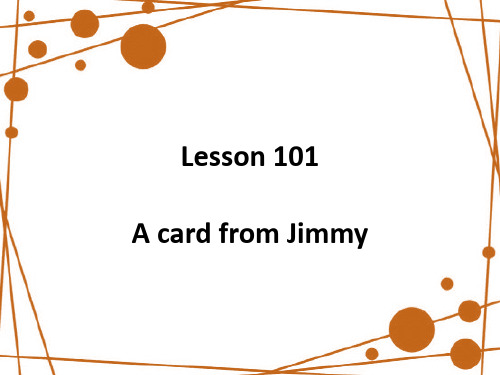
• • • • • • • •
arrive in + 城市 国名(大地点) 城市/ 国名(大地点) 她昨天到了马德里。 她昨天到了马德里。 She arrived in Madrid yesterday. arrive at +公共场所地点名称 公共场所地点名称(airport, 公共场所地点名称 park, the station)(小地点) (小地点) 我们十分钟前到达机场。 我们十分钟前到达机场。 We arrived at the airport the minutes ago. 他们刚刚到这个旅馆。 他们刚刚到这个旅馆。 They have just arrived at the hotel.
直接引语和间接引语
• 直接引语就是直接引用说话人原来所说的 而间接引语就是原话的转述。 话,而间接引语就是原话的转述。 • 直接引语放在引号里,间接引语是把说话 直接引语放在引号里, 人的原话变成宾语从句。 人的原话变成宾语从句。 • 直接引语变间接引语须在人称,时态及地 直接引语变间接引语须在人称, 点状语等方面作相应的变化。 点状语等方面作相应的变化。
• ‘I have just arrived in Scotland and I’m staying at a Youth Hostel.’ • just • 1、刚刚(完成时态) 、刚刚(完成时态) • 她刚刚把钥匙给我。 她刚刚把钥匙给我。 • He has just given the key to me. • 他刚刚去图书馆。 他刚刚去图书馆。 • She has just gone to the library. • 2、正要 刚要 (进行时态 刚要… 进行时态) 、正要…,刚要 进行时态 • 他们刚要作弊, 老 师过来了。 他们刚要作弊, 师过来了。 • They were just cheating. The teacher came here. • 他正要离开,他的父母打电话了。 他正要离开,他的父母打电话了。 • He was just leaving. His parents called.
新概念第一册101,102课课件

一是使用引号引出人家的原话,叫做直接引语; 一是使用引号引出人家的原话,叫做直接引语; 一是用自己的话把人家的话转述出来, 一是用自己的话把人家的话转述出来,叫做间接引语。
ill tired
What he say? He says that he is/feels tired.
What’s the matter with them?
youth hostel
granny Read Jimmy’s card to me please,Penny. Penny He says he’s just arrived in Scotland. He says he’s staying at a Youth Hostel. He says he’ll write a letter soon. He says he hopes we are all well. 宾语从句
What does he want/need? He says that he needs a haircut a licence some money
wait
catch
What can/must/will he do? He says he can/must/will catch the bus.
postcard
Scotland shepherd dog
Dear Mum I have just arrived in Scotland and I’m staying at a Youth Hostel. I’ll write to you soon I hope you are all. Love, Jimmy
• • • • • • •
1 Scotland ['skɔtlənd] n.苏格兰(英国) 2 card [kɑ:d] n.明信片 3 youth [ju:θ] n.青年 4 hostel ['hɔstəl] n.招待所,旅馆 5 association [əsəusi'eiʃən] n.协会 6 soon [su:n] ad. 7 write [rait] v.
ill tired
What he say? He says that he is/feels tired.
What’s the matter with them?
youth hostel
granny Read Jimmy’s card to me please,Penny. Penny He says he’s just arrived in Scotland. He says he’s staying at a Youth Hostel. He says he’ll write a letter soon. He says he hopes we are all well. 宾语从句
What does he want/need? He says that he needs a haircut a licence some money
wait
catch
What can/must/will he do? He says he can/must/will catch the bus.
postcard
Scotland shepherd dog
Dear Mum I have just arrived in Scotland and I’m staying at a Youth Hostel. I’ll write to you soon I hope you are all. Love, Jimmy
• • • • • • •
1 Scotland ['skɔtlənd] n.苏格兰(英国) 2 card [kɑ:d] n.明信片 3 youth [ju:θ] n.青年 4 hostel ['hɔstəl] n.招待所,旅馆 5 association [əsəusi'eiʃən] n.协会 6 soon [su:n] ad. 7 write [rait] v.
新概念英语第一册第101-102课省公开课金奖全国赛课一等奖微课获奖PPT课件
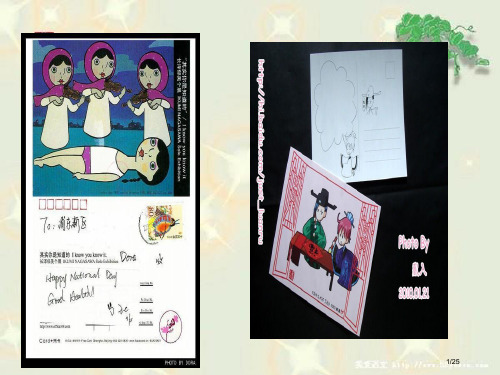
他说他住在一家青年招待所。 你知道,他是“青招协”一个组员 祖母:什么? 彭妮:“青招协”,妈妈。青年招待所协会。 祖母:他还说了些什么? 彭妮:“我很快会写信。
祝你们大家身体都好。” 祖母:什么?彭妮,大声一点。
我可听不见你念。 彭妮:他说他很快会写信。
他祝我们大家身体好。“谨此问候,吉米。” 祖母:就这些吗?他没写许多,是吗? 彭妮:在明信片上他写不了很多,妈妈。
• 1. 通知自己旅游情况。 • 2. 通知他人自己新住址。 • 3. 寄送节日祝福。 • 4. 传达想念。 • 5. 问询对方近况。 • 6. 通知一些必要信息。
• 在书写明信片之前,我们要确定这张明信片主要目标是 什么,确定以后,就能够开始写了。 因为明信片并不是 非常正式文字载体,我们在书写时候能够随意一些,但还 是要注意以下几点:
What’s the matter with him/them? He says that he has a cold.
a headache
a toothache
14/25
a haricut an X- ray
What does he want/need? He says that he needs a haircut
• G: What? Speak up. Penny. I'm afraid I can't hear you
• P: He says he'll write a letter soon.
• He hopes we are all well. 'Love, Jimmy.'
• G: Is that all? He doesn't say very much, does he?
祝你们大家身体都好。” 祖母:什么?彭妮,大声一点。
我可听不见你念。 彭妮:他说他很快会写信。
他祝我们大家身体好。“谨此问候,吉米。” 祖母:就这些吗?他没写许多,是吗? 彭妮:在明信片上他写不了很多,妈妈。
• 1. 通知自己旅游情况。 • 2. 通知他人自己新住址。 • 3. 寄送节日祝福。 • 4. 传达想念。 • 5. 问询对方近况。 • 6. 通知一些必要信息。
• 在书写明信片之前,我们要确定这张明信片主要目标是 什么,确定以后,就能够开始写了。 因为明信片并不是 非常正式文字载体,我们在书写时候能够随意一些,但还 是要注意以下几点:
What’s the matter with him/them? He says that he has a cold.
a headache
a toothache
14/25
a haricut an X- ray
What does he want/need? He says that he needs a haircut
• G: What? Speak up. Penny. I'm afraid I can't hear you
• P: He says he'll write a letter soon.
• He hopes we are all well. 'Love, Jimmy.'
• G: Is that all? He doesn't say very much, does he?
新概念英语第一册Lesson101-102(共12张PPT)
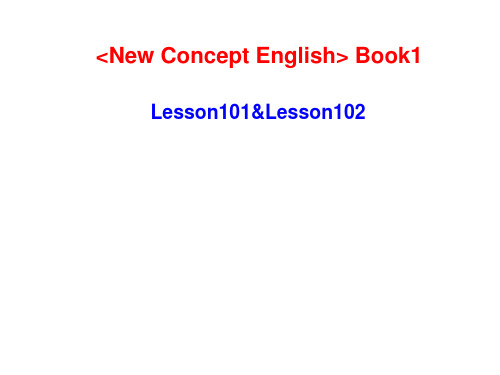
I can't come to the party on Friday.
He says he can't come to the party on Friday.
My parents are very well.
He says his parents are very well.
John has been to New York.
you your yours yourself yourselves 二五变
主对主,宾对宾,物主对物主,反身对反身。 一随主 二随宾 第三人称不更新 一十变 二五变 三不变
I‘m going to learn Chinese.
He says he is going to learn Chinese.
Youth Hostel. You know he's a member of the Y.H.A. G: The what? P: The Y.H.A., Mum. The Youth Hostels Association. G: What else does he say? P: 'I'll write a letter soon. I hope you are all well.' G: What? Speak up,Penny. I'm afraid I can't hear you. P: He says he'll write a letter soon. He hopes we are all well.
1.read ...to…给…读 read sb sth
Read Jimmy's card to me.=Read me Jimmy's card.
新概念英语第一册第101-102课课件
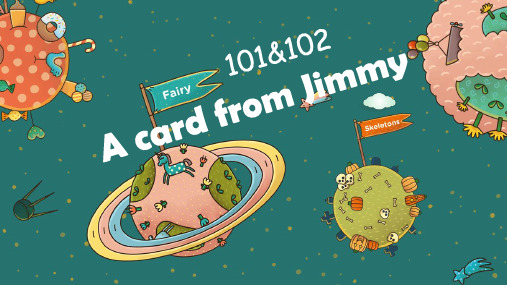
P: He say he'll write a letter soon. He hopes we are all well. 'Love, Jimmy.'
G: Is that all? He doesn't say very much, does he?
P: He can't write very much on a card, Mum.
1、Few of them hurt themselves in the accident last night, ___________ ? 2、His sister had a bad cough, _________she? 3、Mr. Green went to Shenzhen on business last week, ________? 4、John can hardly understand any Chinese, _________he? 5、Don’t smoke in the meeting-room, _________? 6、Lucy, you clean the blackboard today, _______? 7、Miss Cheng will never forget her first visit to Canada ,________? 8、The lady couldn’t say a word when she saw the snake,__________?
他帅么?
Is he handsome?
否定
Isn’t he handsome?
当陈述部分的主语是I,而句子又用来征询对方的意见时,附加疑问句 中的主语用you。
I find English very interesting, don’t you?
G: Is that all? He doesn't say very much, does he?
P: He can't write very much on a card, Mum.
1、Few of them hurt themselves in the accident last night, ___________ ? 2、His sister had a bad cough, _________she? 3、Mr. Green went to Shenzhen on business last week, ________? 4、John can hardly understand any Chinese, _________he? 5、Don’t smoke in the meeting-room, _________? 6、Lucy, you clean the blackboard today, _______? 7、Miss Cheng will never forget her first visit to Canada ,________? 8、The lady couldn’t say a word when she saw the snake,__________?
他帅么?
Is he handsome?
否定
Isn’t he handsome?
当陈述部分的主语是I,而句子又用来征询对方的意见时,附加疑问句 中的主语用you。
I find English very interesting, don’t you?
新概念英语NCE1_Lesson101-102(共45页)课件

• He hopes we are all well. • He hopes that: ‘You are all well.’ • ‘Love, Jimmy.’ • ‘Love xxx, Jimmy.’
• Is that all?
• What else do you want?
• Hotel is bigger better and more beautiful than hostel.
• Hotel is high level. • Youth Hostel 青年招待所 • 我现在住在一个青年招待所。
• I am staying at a Youth Hostel. • 我认为这是苏格兰最好的青年招待所了。
The Youth Hostels Association.
• He says he’s just arrived in Scotland. (间接引语) • He says: ‘I’ve just arrived in Scotland.’(直接
引语) • He says he’s staying at a Youth Hostel.
Answer some questions:
• What does he say? • Is he a member of the Y.H.A.? • What is the Y.H.A.?
G: What else does he say? P: ‘I’ll write a letter soon. I hope you are all well.’
• 直接引语:直接引用别人的话,把它放在单引 号里。
• 间接引语:转述别人的话,人称发生改变。
• 直接引语变间接引语,如果主句是一般现在时, 从句人称发生改变,时态不变。并去掉单引号。
• Is that all?
• What else do you want?
• Hotel is bigger better and more beautiful than hostel.
• Hotel is high level. • Youth Hostel 青年招待所 • 我现在住在一个青年招待所。
• I am staying at a Youth Hostel. • 我认为这是苏格兰最好的青年招待所了。
The Youth Hostels Association.
• He says he’s just arrived in Scotland. (间接引语) • He says: ‘I’ve just arrived in Scotland.’(直接
引语) • He says he’s staying at a Youth Hostel.
Answer some questions:
• What does he say? • Is he a member of the Y.H.A.? • What is the Y.H.A.?
G: What else does he say? P: ‘I’ll write a letter soon. I hope you are all well.’
• 直接引语:直接引用别人的话,把它放在单引 号里。
• 间接引语:转述别人的话,人称发生改变。
• 直接引语变间接引语,如果主句是一般现在时, 从句人称发生改变,时态不变。并去掉单引号。
新概念第一册101-102课件
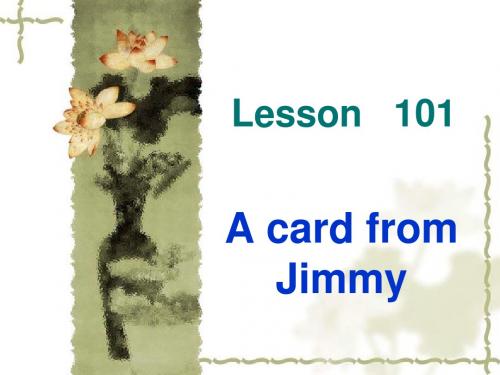
1. a fine day. Let’s go fishing, D ? A. won‘t we B. will we C. don’t we D. shall we A 2.Be sure to write to us, ___? A. will you B. aren't you C. can you D. mustn't you 3. --You haven't been to Beijing, have you? D --_____.How I wish to go there! A. Yes, I have B. Yes, I haven't C. No, I have D. No, I haven't
2.‘I
have just arrived in Scotland and I’m staying at a Youth Hostel.’
just 1、刚刚(完成时态) eg: She has just gone to the library.
2、正要…,刚要… (进行时态) eg: He was just leaving. His parents called.
回答反意疑问句要根据实际情况而定。
eg:实际情况:He is an engineer.
(1) He is an engineer, isn’t he? 他是一个工程师,不是吗? (2)He isn’t an engineer, is he? 他不是一个工程师,是吗? --Yes, he is.(不,他是。)
card n. 明信片,卡片
Christmas card 圣诞卡 ID card 身份证 business card 名片 post card 明信片 credit card 信用卡 play card 扑克
- 1、下载文档前请自行甄别文档内容的完整性,平台不提供额外的编辑、内容补充、找答案等附加服务。
- 2、"仅部分预览"的文档,不可在线预览部分如存在完整性等问题,可反馈申请退款(可完整预览的文档不适用该条件!)。
- 3、如文档侵犯您的权益,请联系客服反馈,我们会尽快为您处理(人工客服工作时间:9:00-18:30)。
Comprehension
1 T: What does Grandmother want Penny to
read to her? S: Jimmy's Card. 2 T: Where is Jimmy? S: He's in Scotland. 3 T: Has Jimmy been in Scotland for a long
1)写,书写 • Write your name and address here, please.
请你把姓名,地址写在这里。
• Shall I write in pencil or in ink? 我用铅笔还是用钢笔写? 2)write to sb. 给某人写信
• I write to my family twice a month. 我一个月给我家人写两封信。
该国的青年人 一 般都有礼貌。
2)青年(少年)时期,青春时期 • He spent his youth in the U.S.A
他少年时代在美国度过 3)青春
She lost her youth. 她青春不再
She kept her youth. 她青春依旧
•
soon adv.
1)不久
• He will be back soon.
time? S: No, he hasn't.
4 T: Where does he say he's staying? S: At a Youth Hostel.
5 T: Does he say he'll write a letter soon? S: Yes, he does.
6 T: What else does he say? S: He says he hopes they are all well.
card
n. 明信片,卡片
postcard 明信片
credit card 信用卡
an ID card 身份证
a birthday card
生日卡片
a new year card
新年贺卡
名片
扑克
Play cards 打扑克
youth n.
1)n. 青年人,年轻人(单复数同形) • The youth of the nation is polite in general.
• She said to me,“I have left my book in your room.” • She told me that she had left her book in my room.
2. 如果直接引语为疑问句,变为间接引语时关联词 用whether, if 或其他疑问词;词序与一般从句相同, 引述动词常用say, ask, wonder等。
• “Is he your brother?” he said. • He asked if he was my brother. • Mr. Smith asked, “What is your name?” • Mr. Smith asked what my name was.
• 如果直接引语为祈使句,变为间接引语时多用 “名词(代词)+不定式”结构。
直接引语和间接引语
• 直接引语就是直接引用说话人原来所说的话,而 间接引语就是原话的转述。
• 直接引语放在引号里,间接引语是把说话人的原 话变成宾语从句。
• 直接引语变间接引语须在人称,时态及地点状语 等方面作相应的变化。
1.如果直接引语为陈述句,变为间接引语时常用从 属连词that引导(口语中可省略),引述动常常用 say, tell等。同时,概据主语的要求,间接引语须 在人称,时态及其它方面作相应的变化。
新概念英语第101-102课 课件
2020/9/21
New Word and expressions 生词和短语
Scotland n. 苏格兰(英国)
card
n. 明信片
youth
n. 青年
hostel
n. 招待所,旅馆
association n. 协会
ቤተ መጻሕፍቲ ባይዱ
soon
adv. 不久
write (wrote, written) v. 写
• 1)引述表示命令的祈使句,常用动词order, tell, warn;
• 2)引述表示请求的祈使句,常用动词ask, beg; • 3)引述表示建议、劝告的祈使句,常用动词advise
等。
• The boss said,“Please come here again tomorrow.”
• --The boss asked me to go there again the next day.
7 T: Why does Grandmother ask Penny to
speak up? S: Because she can't hear very well. 8 T: How much can Jimmy write on a card? S: Not very much.
课文讲解
1.Read Jimmy’s card to me please, Penny. read sth to sb 把…读给…听(read sb sth) • Read the newspaper to me. 读这份报纸给我听。 • Can you read the letter to me? 你能给我读一下这封信吗?
2. ‘I have just arrived in Scotland and I’m staying at a Youth Hostel.’
just 1、刚刚(完成时态) • She has just gone to the library.他刚刚去 图书馆。
2 .正要…,刚要… (进行时态)
• He was just leaving. His parents called. 他正要离开,他的父母打电话了。
他不久就会回来。
2)快,早
• Winter has come too soon.
冬天来得太早了
• The sooner, the better.越快越好
注意:as soon as 一…就… • Tell me as soon as you have finished.
你一完成就告诉我
write v.
